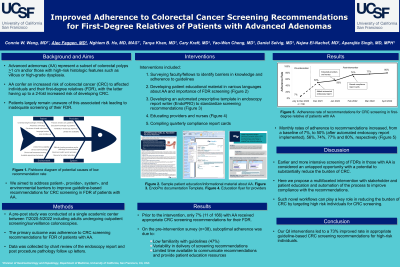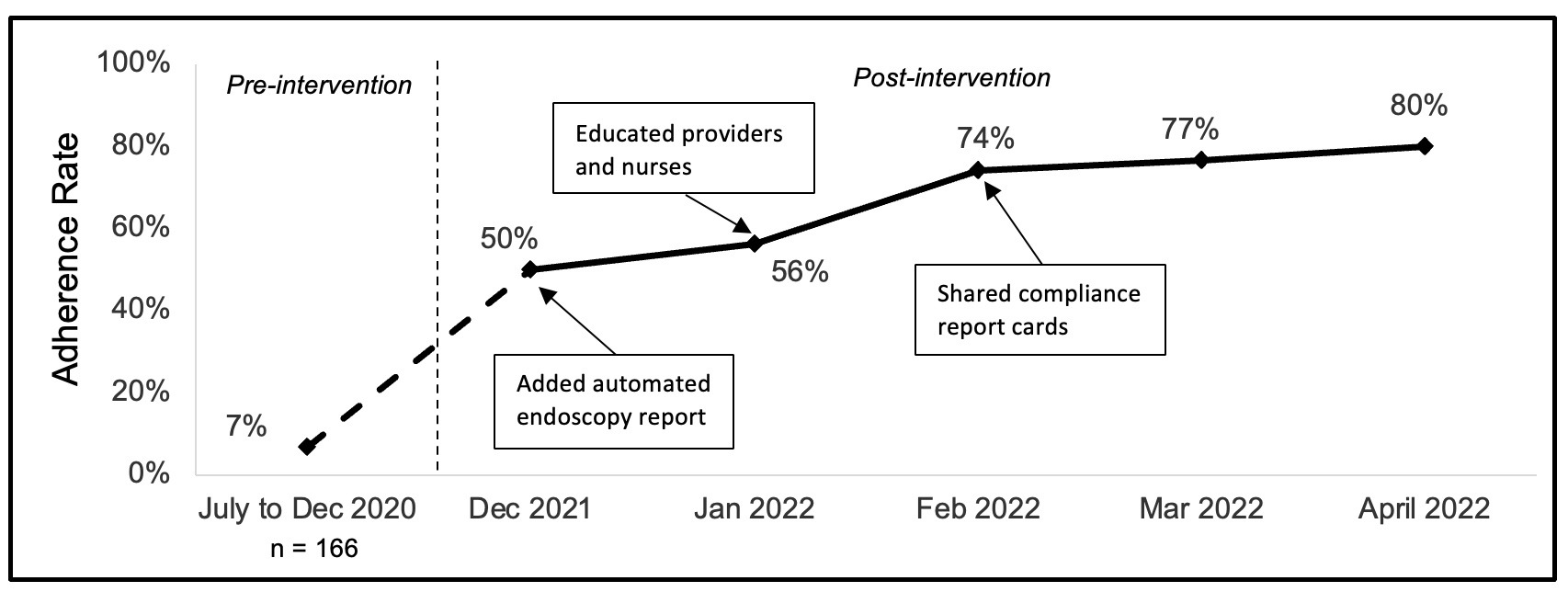Back


Poster Session B - Monday Morning
Category: Colorectal Cancer Prevention
B0178 - Improving Adherence to Colorectal Cancer Screening Recommendations for First-Degree Relatives of Patients With Advanced Adenomas
Monday, October 24, 2022
10:00 AM – 12:00 PM ET
Location: Crown Ballroom

Has Audio

Connie Wang, MD
University of California, San Francisco
San Francisco, CA
Presenting Author(s)
Award: Outstanding Research Award in the Colorectal Cancer Prevention Category (Trainee)
Award: Presidential Poster Award
Connie Wang, MD1, Nghiem B. Ha, MD, MAS1, Alec Faggen, MD2, Tanya Khan, MD1, Cary Kraft, MD1, Yao-Wen Cheng, MD1, Daniel Selvig, MD1, Najwa El-Nachef, MD3, Aparajita Singh, MD1
1University of California, San Francisco, San Francisco, CA; 2UCSF Medical Center, San Francisco, CA; 3University of California San Francisco, San Francisco, CA
Introduction: Advanced adenoma (AA), defined as polyp size ≥1 cm or histologic features with villous or high-grade dysplasia, is common and confers an increased risk of colorectal cancer (CRC) to affected individuals and their first-degree relatives (FDR). Patients are unaware of this associated risk leading to inadequate screening of FDR. Also, practice variation regarding screening age/interval results in inconsistent recommendations. In this quality improvement study, we aimed to improve adherence to CRC screening recommendations for FDR of patients with a multifaceted intervention.
Methods: A pre-post study was conducted at a single academic center between 7/2020-5/2022 including adults undergoing outpatient screening/surveillance colonoscopy. Interventions included (1) surveying faculty/fellows on barriers to adhering to guidelines, (2) creating patient education materials in various languages on AA and importance of FDR screening, (3) standardizing screening recommendations with an automated prescriptive template in the endoscopy report, (4) educating providers and nurses, and (5) sharing quarterly compliance reports. The primary outcome was adherence to CRC screening recommendations for FDR of patients with AAs. Data were collected by chart review of the endoscopy report and post-procedure pathology follow up letters.
Results: Prior to the intervention, only 7% (11 of 166) with AA received appropriate CRC screening recommendations for their FDR. On the pre-intervention survey (n=38), suboptimal adherence was due to low familiarity with guidelines (47%), variability in delivery of screening recommendations (5% in endoscopy report; 18% spoke to patient; 13% communicated to primary provider; 47% no recommendation), and limited time available to communicate recommendations and provide patient education. Development of an automated template to standardize recommendations was implemented on 12/2021, followed by improved monthly rates of adherence to recommendations, from a baseline of 7% to 50%, 56%, 74%, 77% and 80%, respectively (Figure).
Discussion: Earlier and more intensive screening of FDRs in those with AA is considered an untapped opportunity with the potential to substantially reduce the burden of CRC. This project utilizes stakeholder/patient education and automation of the process to improve compliance with the recommendations. Such novel workflows can play a key role in reducing the burden of CRC by targeting high-risk individuals for CRC screening.

Disclosures:
Connie Wang, MD1, Nghiem B. Ha, MD, MAS1, Alec Faggen, MD2, Tanya Khan, MD1, Cary Kraft, MD1, Yao-Wen Cheng, MD1, Daniel Selvig, MD1, Najwa El-Nachef, MD3, Aparajita Singh, MD1. B0178 - Improving Adherence to Colorectal Cancer Screening Recommendations for First-Degree Relatives of Patients With Advanced Adenomas, ACG 2022 Annual Scientific Meeting Abstracts. Charlotte, NC: American College of Gastroenterology.
Award: Presidential Poster Award
Connie Wang, MD1, Nghiem B. Ha, MD, MAS1, Alec Faggen, MD2, Tanya Khan, MD1, Cary Kraft, MD1, Yao-Wen Cheng, MD1, Daniel Selvig, MD1, Najwa El-Nachef, MD3, Aparajita Singh, MD1
1University of California, San Francisco, San Francisco, CA; 2UCSF Medical Center, San Francisco, CA; 3University of California San Francisco, San Francisco, CA
Introduction: Advanced adenoma (AA), defined as polyp size ≥1 cm or histologic features with villous or high-grade dysplasia, is common and confers an increased risk of colorectal cancer (CRC) to affected individuals and their first-degree relatives (FDR). Patients are unaware of this associated risk leading to inadequate screening of FDR. Also, practice variation regarding screening age/interval results in inconsistent recommendations. In this quality improvement study, we aimed to improve adherence to CRC screening recommendations for FDR of patients with a multifaceted intervention.
Methods: A pre-post study was conducted at a single academic center between 7/2020-5/2022 including adults undergoing outpatient screening/surveillance colonoscopy. Interventions included (1) surveying faculty/fellows on barriers to adhering to guidelines, (2) creating patient education materials in various languages on AA and importance of FDR screening, (3) standardizing screening recommendations with an automated prescriptive template in the endoscopy report, (4) educating providers and nurses, and (5) sharing quarterly compliance reports. The primary outcome was adherence to CRC screening recommendations for FDR of patients with AAs. Data were collected by chart review of the endoscopy report and post-procedure pathology follow up letters.
Results: Prior to the intervention, only 7% (11 of 166) with AA received appropriate CRC screening recommendations for their FDR. On the pre-intervention survey (n=38), suboptimal adherence was due to low familiarity with guidelines (47%), variability in delivery of screening recommendations (5% in endoscopy report; 18% spoke to patient; 13% communicated to primary provider; 47% no recommendation), and limited time available to communicate recommendations and provide patient education. Development of an automated template to standardize recommendations was implemented on 12/2021, followed by improved monthly rates of adherence to recommendations, from a baseline of 7% to 50%, 56%, 74%, 77% and 80%, respectively (Figure).
Discussion: Earlier and more intensive screening of FDRs in those with AA is considered an untapped opportunity with the potential to substantially reduce the burden of CRC. This project utilizes stakeholder/patient education and automation of the process to improve compliance with the recommendations. Such novel workflows can play a key role in reducing the burden of CRC by targeting high-risk individuals for CRC screening.

Figure: Adherence rate of recommendations for colorectal cancer screening in first-degree relatives of patients with advanced adenomas
Disclosures:
Connie Wang indicated no relevant financial relationships.
Nghiem Ha indicated no relevant financial relationships.
Alec Faggen indicated no relevant financial relationships.
Tanya Khan indicated no relevant financial relationships.
Cary Kraft indicated no relevant financial relationships.
Yao-Wen Cheng indicated no relevant financial relationships.
Daniel Selvig indicated no relevant financial relationships.
Najwa El-Nachef: Federation Bio – Advisory Committee/Board Member, Consultant. Ferring – Advisory Committee/Board Member. Finch Therapeutics – Grant/Research Support. Freenome – Grant/Research Support. Seres – Grant/Research Support.
Aparajita Singh indicated no relevant financial relationships.
Connie Wang, MD1, Nghiem B. Ha, MD, MAS1, Alec Faggen, MD2, Tanya Khan, MD1, Cary Kraft, MD1, Yao-Wen Cheng, MD1, Daniel Selvig, MD1, Najwa El-Nachef, MD3, Aparajita Singh, MD1. B0178 - Improving Adherence to Colorectal Cancer Screening Recommendations for First-Degree Relatives of Patients With Advanced Adenomas, ACG 2022 Annual Scientific Meeting Abstracts. Charlotte, NC: American College of Gastroenterology.

